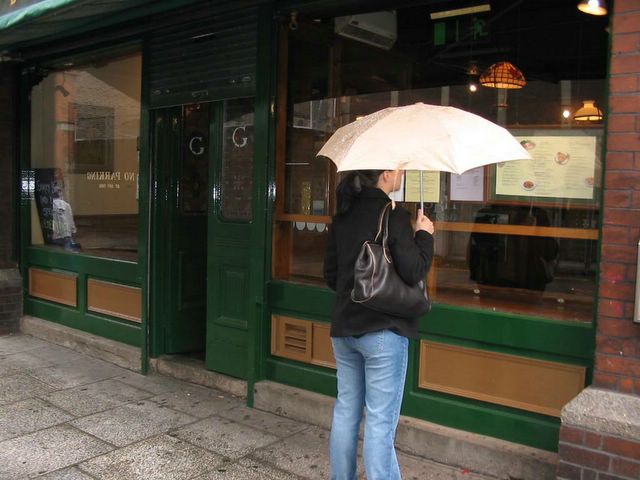Haitians
ex`haust 1. To wear out completely, to use up. 4. An apparatus for drawing out noxious air or waste gases by means of a partial vacuum
Due to the fact that I have been mad at work for what seems like 48 hours (and not the fun, Eddie Murphy kind) on the fifty pages of dissertation-ese that I have to turn in to my advisor tomorrow, I feel quite unable to summon up the strength for even one more. single. (sensical) word. But I see that it is time to post something, anything, for my loyal blog readers. So I am making an unsatisfying compromise and stealing from my own work to reprint here--for purposes of your edification/insomnia--an excerpt of what I have been working on for the last few hours instead of this blog. Pretend you're in grad school for a minute and that you care about this stuff. Or that you're an eager undergrad who still likes to talk about poetry. Or at least grant me a free pass for not putting up a real post.
Before I cut and paste, take a total non-sequitur with me down memory lane as I commemorate the ten-year anniversary of that national classic, "Clueless." It is, after all, about all my fried brain can handle at present. As I microwaved a bowl of frozen peas this afternoon to eat at my laptop (yeah, that was another shameless plea for sympathy), I chuckled as I remembered hearing that Alicia Silverstone actually pronounced it "Hatee-ins" in rehearsal. They, naturally, kept it in; the producers found that her real-life cluelessness provided a perfect line-reading. What a dumb blonde. Anyway. Happy Boland-ing!
* * * * *
Personal history is bound up in “The Making of an Irish Goddess” as well, but this time it is Boland’s own. Like “The Achill Woman” and other poems in Outside History, this poem reveals Boland’s increasing political engagement and awareness of Irish history, tied as always to the intimate details of a woman’s personal, private life. The speaker of the poem resides in a suburban environment, as so many of Boland’s speakers do, and yet the poem’s words transport the reader through myth and Irish history, making a separation between public and private realms impossible.
“Ceres went to hell / with no sense of time” the poem begins, anchoring it in the ancient and public world of Greek myth. The poem describes the “seasonless, unscarred earth” that the goddess Ceres presided over before the loss of her daughter Persephone to the underworld instigated the change in seasons. Like Ceres, the speaker of the poem presides over her own personal world, not as a god per se, but as a mother. This mother must also retrieve her daughter, but unlike Ceres, the speaker already lives in a world of seasons upon which an entire population can be dependent. Boland moves from the world of myth to the world of Irish history by introducing the tragedy of the Irish famine, in which the country was decimated by the potato blight and repeated crop failures in the 1840's. An Irish goddess, unlike a Greek one, must carry an awareness of time and the seasons in which her people suffered:
In my body,…
in my gestures— …
must be
an accurate inscription of that agony:
the failed harvests,
the fields rotting to the horizon,
the children devoured by their mothers
whose souls, they would have said,
went straight to hell,
followed by their own (ll. 14, 18, 21-29).
After the poem telescopes out to encompass Greek myth and one of the darkest periods in Irish history, its focus zeroes in on a highly commonplace moment in suburban life to end the poem. As a result of the poem’s earlier inflections, this moment is infused with the drama of loss that seems inherent to the mother-daughter relationship as Boland sees it:
Myth is the wound we leave
in the time we have—
which in my case is this
March evening
at the foothills of the Dublin mountains,
across which the lights have changed all day,
holding up my hand
sickle-shaped,
to my eyes to pick out
my own daughter from
all the other children in the distance;
her back turned to me (ll. 31-42).
By recasting the myth of Ceres in an Irish context and setting its final action in the suburbs, Boland makes the ancient world of myth and the past experience of Irish famine relevant to ordinary contemporary life, infusing the domestic environment with the whole weight of Irish history and suffering. The poem also shows how an engagement with Irish history, politics, and the wider world is not only possible in the suburb, but, because of the overlap between public events and private experiences, inevitable and necessary. The famine may have been the result of agricultural calamity and British policy conducted in the realm of the public, but Boland makes the Irish famine about the private tragedies that resulted—the unfathomable lengths to which the event drove Irish mothers.
bla-bla, blablabla blah. Etc.
Yours truly,
one exhausted kitten


2 Comments:
How did you find a picture of a kitten who sleeps exactly the same way that you do?
f me. you may be one exhausted kitten, but this overfed housecat is worn and weary just for having read that. is good and i like it, but i haven't had more than a fleeting thought about boland in 8 years. is taxing.
Post a Comment
<< Home